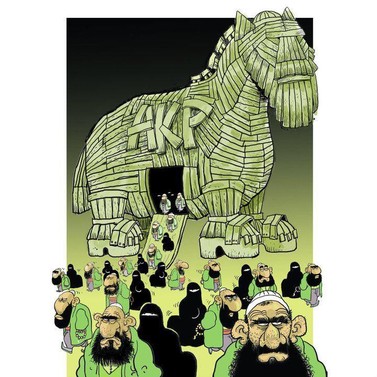Thanks for stopping by our website!
The Republic of Turkey’s Minister of Science, Technology, and Industry Minister’s visit to Silicon Valley and Tech Industry between March 18-23 is
a hypocritical effort amidst the Turkish Government’s human rights violations on freedom of speech, access to internet, social media, and the right to assembly.
TAGP sees the arrival of Mr. Fikri Isik as a fabricated effort to divert attention from the human rights violations undertaken by the Republic of Turkey. We ask for support in our effort to foster democracy, restore freedom of speech and improve the current education system in Turkey.
Please scroll down to see why we're protesting.
The Republic of Turkey’s Minister of Science, Technology, and Industry Minister’s visit to Silicon Valley and Tech Industry between March 18-23 is
a hypocritical effort amidst the Turkish Government’s human rights violations on freedom of speech, access to internet, social media, and the right to assembly.
TAGP sees the arrival of Mr. Fikri Isik as a fabricated effort to divert attention from the human rights violations undertaken by the Republic of Turkey. We ask for support in our effort to foster democracy, restore freedom of speech and improve the current education system in Turkey.
Please scroll down to see why we're protesting.
Internet Censorship in Turkey
- Access to 67,818 websites is blocked.
- Highest number of websites were blocked in 2013, when Gezi Park protests occurred.
- According to the government, the main reason for the censorship on internet is to prohibit access to websites with erotic content and child abuse. However, the list for currently blacked out websites includes Google Sites, Scribd, World News Network, and The Legatum Institute.
- In March 2014, access to websites such as Twitter and YouTube were temporarily blocked after the release of audio recordings that show corruption in then-Prime Minister (current President) Recep Tayyip Erdogan’s inner circle. Erdogan vowed to "wipe out Twitter" no matter what the international community thinks.
- Many internet users have received fine, prison time or suspension sentences based on the comments they have made on social media sites.
- According to Twitter's 2014 Transparency Report, Turkey became the top country issuing content removal requests to Twitter.
- Freedom of Net 2014 survey defines the status of internet access in Turkey as “partially free”.
- In September 2014, government legislated a new law, which allows banning of websites in 4 hours after the decision of allow Turkey's Telecommunications Authority (TIB), without the need for decision of the court.
- The law requires internet providers to save all data on the activities of web users' for two years and share it with the authorities upon request.
- With this new law it is no longer possible to access the forbidden content by changing DNS settings and using VPN service since, the IP address of the websites are blocked.
- NEW Turkish parliament has approved a bill that would tighten government controls over the internet. Here's more info on it in Turkish.
|
Further Reading___________________________________
http://en.wikipedia.org/wiki/Censorship_in_Turkey http://www.aljazeera.com/indepth/features/2014/02/new-internet-law-turkey-sparks-outrage 201422312144687859.html http://engelliweb.com/ (in Turkish) http://turk-internet.com/portal/yazigoster.php?yaziid=48898 (in Turkish) http://privacy.cyber-rights.org.tr/?page_id=255 (in Turkish) |
Science and Education Policy of the Government
- March 2009 Turkish Scientific and Technological Research Council (TÜBITAK) censored a story about Charles Darwin and the theory of evolution in the associated journal, in Darwin’s 200th birthday. The cover picture of the journal was changed at the last minute and the chief editor was removed from her position.
- July 2011 TÜBITAK closed down the Feza Gürsey Institute, which was a prestigious research institute with an impressive record in theoretical physics and mathematics. TÜBITAK stated in the press release that basic sciences are only useful when they are applied (!) and employed in synergy with engineering.
- August 2011 The government destroyed the autonomous nature of Turkish Science Academy (TÜBA) by declaring that the president and majority of the members of the academy will be selected by the government associated institutions. To protest this decision 52 of 82 regular members of TÜBA resigned and established a new independent association called “Bilim Akademisi”- the Science Academy (BAD).
- February 2012 Then-Prime Minister (current President) Recep Tayyip Erdogan declared that his government aims at raising a “religious youth”. As a response, 3000 academics from renowned research institutes around the world signed a petition, stating that the Turkish education system should be secular, providing everyone equal opportunity, bringing up generations with the capacity of critical thinking and love for humanity and nature.
- June 2013 During Gezi Park Protests, academics and university students who were thought to be involved in the protests were threatened to have their funding cut off and some of them received academic penalties.
- According to the EgitimSen’s (Union for education and science workers) 2014 statistics, the number of Imam Hatip schools, schools with religion studies established to train preachers, increased 7 fold in the last 11 years.
- November 2014 “Reproduction in Humans” topic was removed from high school Science and Technology curriculum.
- January-February 2015 Thousands of people protested against the religious education policy imposed by the government and called for secular and scientific education.



